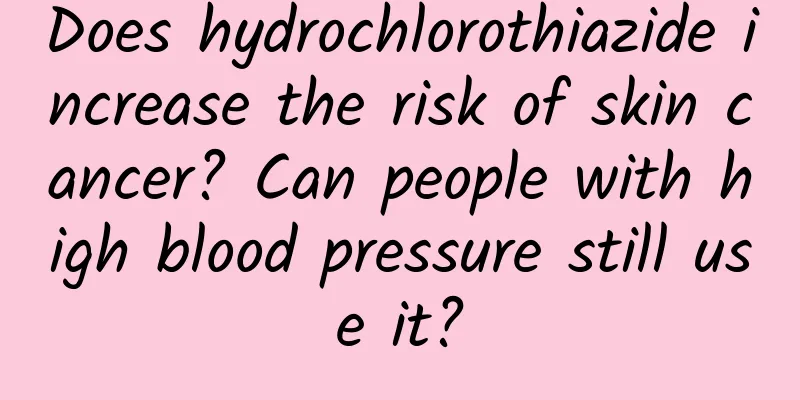Does hydrochlorothiazide increase the risk of skin cancer? Can people with high blood pressure still use it?

|
A friend told Huazi that he saw a piece of news saying that hydrochlorothiazide, a diuretic and antihypertensive drug, has a cancer risk. He has high blood pressure and has been taking this drug. Can he continue to use it in the future? Huazi said that the news is true. The Medicines and Healthcare products Regulatory Agency (MHRA) of the United Kingdom issued a warning on hydrochlorothiazide in 2018; the US Food and Drug Administration (FDA) revised the safety-related label of hydrochlorothiazide in 2020, both indicating that the drug may slightly increase the risk of non-melanoma skin cancer. 1. What is hydrochlorothiazide? Hydrochlorothiazide is a commonly used diuretic drug that can be used to treat edema diseases, central or nephrogenic diabetes insipidus, nephrolithiasis, and hypertension. It is now mainly used to treat hypertension, especially for elderly hypertension with isolated systolic blood pressure (high blood pressure). Hydrochlorothiazide inhibits the reabsorption of renal tubules, which reduces the reabsorption of sodium ions, chloride ions and water in the primary urine, produces a diuretic effect, reduces blood volume, and has a significant effect on reducing volume-type hypertension. It can also reduce the sodium ion level in the human body, reduce the excitability of vascular smooth muscle, dilate blood vessels, and produce a lasting antihypertensive effect. 2. "Mildly" increased risk of skin cancer. The results of drug epidemiological studies in the Danish Cancer Registry and the Danish National Prescription Registry showed a cumulative dose-dependent relationship between hydrochlorothiazide and non-melanoma skin cancer. The US FDA's "Sentinel Project" study shows that for people taking hydrochlorothiazide, the risk of skin cancer increases by approximately 1 case per 16,000 people each year; if the cumulative dose of hydrochlorothiazide reaches more than 50,000 mg, the risk of skin cancer increases by approximately 1 case per 6,700 people. That is to say, for hypertensive patients taking hydrochlorothiazide, the usual dosage is 12.5mg~25mg per day. After taking the medicine for 5~10 years, the risk of skin cancer will increase by about 0.015%. 3. Rationally look at the risks of medication. There is a saying in my country since ancient times that "all medicines are poisonous". When using medicines, there will be both benefits and risks. Therefore, drug treatment is to weigh the pros and cons between benefits and risks. Only when the benefits far outweigh the risks, medication is recommended. The increased risk of cancer from taking hydrochlorothiazide is lower than that from smoking and eating barbecue frequently. However, it has significant effects on controlling high blood pressure, treating heart failure, and preventing cardiovascular and cerebrovascular diseases such as cerebral hemorrhage, cerebral infarction, and myocardial infarction, and the benefits far outweigh the risks. We need to look at the risk of skin cancer increased by hydrochlorothiazide rationally. The degree of increase is very low. For an individual, such a low probability of cancer is not meaningful. It only makes sense when the population base is very large. IV. How to reduce the cancer risk of hydrochlorothiazide 1. Avoid high-dose use: The increased cancer risk of hydrochlorothiazide is related to the dosage. It is recommended to use a small dose of hydrochlorothiazide in combination with other antihypertensive drugs such as diazepam, pril, and sartan to avoid using large doses alone. 2. Avoid sunlight exposure: Hydrochlorothiazide is a photosensitive drug. Direct exposure to sunlight during medication can easily cause skin damage and skin inflammation, and increase the risk of potential skin cancer. Therefore, you must take good sun protection and avoid light when taking the drug. 3. Skin cancer screening: During medication, if skin damage occurs or suspicious changes occur in moles on the body, seek medical attention promptly. 4. Use alternative drugs: Except for hydrochlorothiazide, other diuretics have not been found to increase the risk of skin cancer. You can consider using other diuretics such as indapamide and chlorthalidone as substitutes. To sum up, hydrochlorothiazide, a diuretic drug, will slightly increase the risk of skin cancer, but the increased probability of cancer is very low, and patients with hypertension can still take it normally. If a drug is found to have a greater risk, it will definitely be recalled. Currently, hydrochlorothiazide only has a mild risk warning. You just need to be more careful when using it and don't worry too much. The drug must be used under the guidance of a doctor. If you have any questions about the use of the drug, please consult a doctor or pharmacist. I am pharmacist Huazi. Welcome to follow me and share more health knowledge. |
>>: How to choose a ripe jackfruit? What kind of fruit is jackfruit?
Recommend
What are the pathological classifications of endometrial hyperplasia?
The endometrium is an important component of the ...
There is blood in my underwear when I am pregnant
Some pregnant women will experience a small amoun...
Canalys: Southeast Asia's smartphone market to grow 11% in 2024
Southeast Asia’s smartphone market rebounds in 20...
What happened to Zhang Jie's 2019 Wuhan concert being cancelled? Is it true that Zhang Jie and his agency are trying to save money?
When the official announcement of the time of Zha...
Which is better, winter bamboo shoots or spring bamboo shoots? How to deal with spring bamboo shoots
Winter bamboo shoots are recognized as the queen ...
What causes vaginal discharge after pregnancy?
Women's bodies are relatively weak during pre...
Why is vaginal discharge yellow?
By observing the leucorrhea, we can effectively d...
What is the cause of bleeding one month after delivery?
Some women experience slight vaginal bleeding aft...
The hormone that causes the endometrium to grow is
The growth of the uterine wall actually changes w...
International Stuttering Day | Listen to me slowly, and redefine the name of "stuttering"
Author: Zhou Yi, Associate Professor of Xi'an...
What are the symptoms of scar pregnancy?
If a woman chooses to have a caesarean section du...
Women have weak urination and thin urine flow
Due to seasonal factors or work pressure, many wo...
The benefits of eating turtle after miscarriage
Wild turtles are very nutritious and are good for...
What are the benefits of eating pickled pepper chicken feet? Characteristics of pickled pepper chicken feet
Pickled pepper chicken feet originated from Chong...









